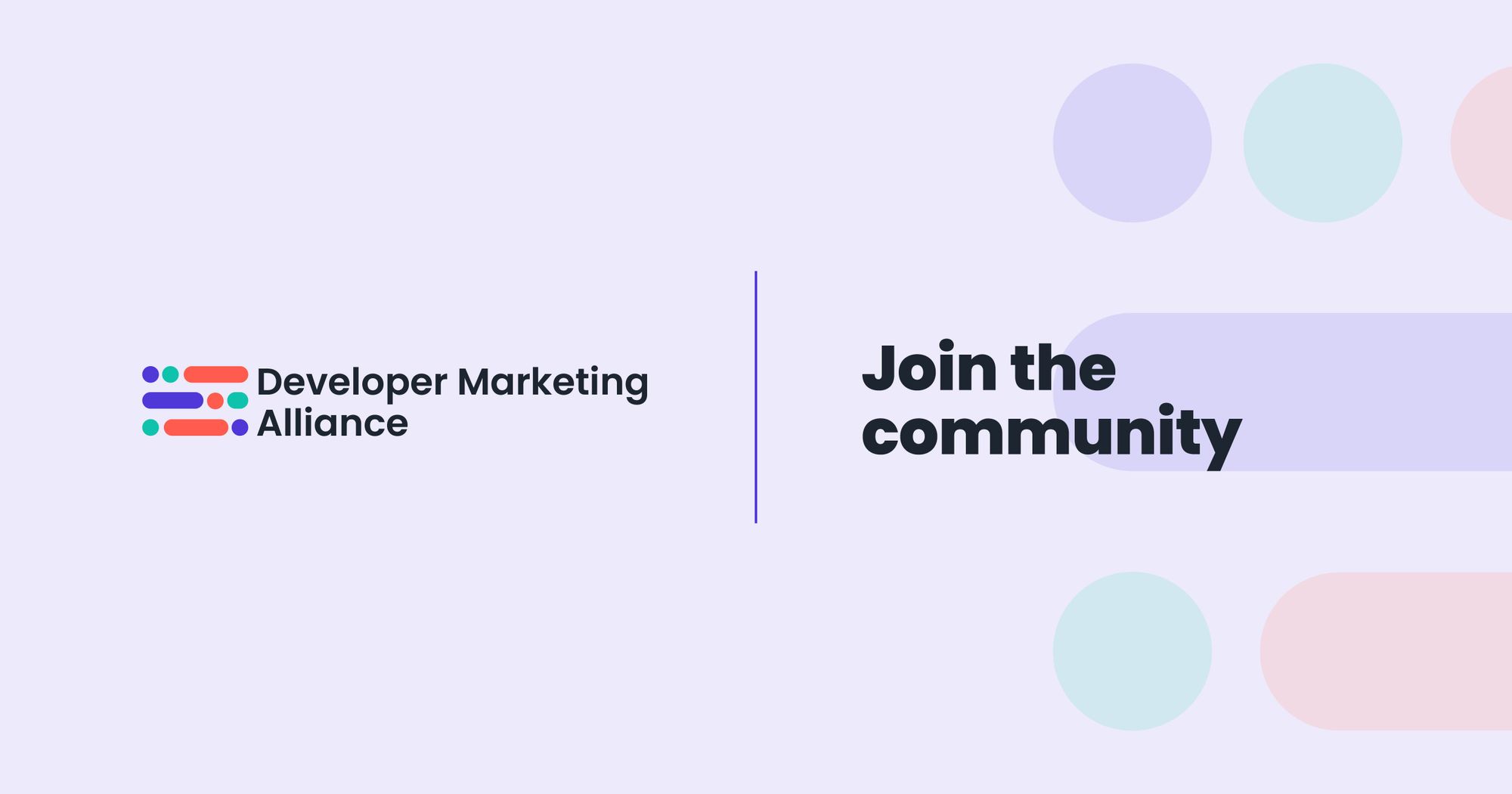How do you build your developer marketing and developer relations functions? What’s the impact of cross-functional collaboration? What’s the future of this industry?
During our fantastic Developer Marketing Summit in March 2022, Arabella David, Head of Developer Marketing at Meta, led a panel discussion sharing some the best wisdom, tips, tricks and hacks for a productive collaborative approach between developer marketing and developer advocates/relations with three industry experts:
- Ben Lloyd Pearson, Director of Developer Marketing at Mattermost
- Ricardo Navarro, Developer Relations & Community Lead at Stripe
- Cherry Manrao, Vice President of Developer & Partner Relations at DocuSign
Check out the discussion’s highlights below (or watch the whole session here).👇
Do developers hate marketing?
Ben Lloyd Pearson
Your typical developer is on a mission, which is usually to solve a very specific problem. You need to meet them where they are on their journey and provide the tools and resources to help them.
All technical content you generate should feed into your persuasive narratives. Whether that's a website page, blog posts, documentation, SDKs, code, examples or tooling, developers are gonna dive deep into everything when they're investigating their problem. If you save them time by providing a useful tool and educating them, they'll naturally grow to appreciate you.
We're all collectively realizing that we need a more holistic approach to market to developers. Marketing doesn't necessarily need to own every single one of those technical content pieces I was describing, but they do have a major stake in its success.
By educating, pitching, not blocking important information behind requests for personal information, avoiding spamming with irrelevant information, developers will love you and grow to embrace you more than just accept you.

Ricardo Navarro
Developers don't like bad marketing when it’s aimed at them. If you're going to do some marketing campaigns, and you're not quite sure about the copy you're using because you're not an engineer or have a developer background yourself, ask one of your engineers if it makes sense to them. It's happened to me many times where their feedback was that it didn’t make sense and I had to change the copy.
I'm being intentional with the communication I'm putting out there. All communication we're sending to developers is some sort of marketing so we have to be more aware of this persona, vs your traditional marketing teams who can blanket their marketing campaigns per segment and not think about technical audiences.
I've seen very successful marketing campaigns developers love because it was the right tone directed to and intended for developers.

For example, when we launched our developer community, which was the first time we had a launch for our developer audience, we created different code snippets within GIFs and animations teasing the launch. If you are a developer, you could decipher what we were saying but not if you weren’t and that was intentional.
We wanted to make sure developers knew we were communicating to them and that the communication was specifically for them. Last year, those teaser and launch animations were one of the highest engaged social media assets we had, which was really exciting to see.
Cherry Manrao
The traditional marketing tactics still work with developers. With messaging, it’s about being honest, clear and useful, and narrowing in. You're writing technical docs, where you're getting right to the point of bypassing all the marketing fluff and getting to what's useful for the developer.

How does developer marketing and developer relations/advocacy show up in your organization?
Cherry Manrao
DocuSign is a big company, with around 7000-8000 employees. This team lives within the product and engineering organization. I've got a few different teams under developer experience.
Developer marketing is one function, developer relations is another function, we also have an ISV (independent software vendor) focus as well, because the way they structure is slightly different. All of this lives within product and engineering and our marketing organization is separate.
Our developer marketing teams will work with our corporate marketing teams and leverage the same tech stack, but the function itself of developer marketing (and the expertise on developer) resides within the product and engineering organization.
Having the ability to scale with our broader marketing organization and have them bought in and activate on the developer piece would give us a tremendous amount of scale and growth.
From startup to here, it has worked for us and, as we evolve as a company, there's exploration on how we ensure all of marketing thinks about this persona and audience and ensures it shows up everywhere in everything we do.

Ben Lloyd Pearson
All of our DevRel falls underneath developer marketing at our company. In terms of our primary goals, there's three things that I focus on:
- Awareness → Finding new audiences and attracting them to our ecosystem.
- Engagement → Engaging them with content that resonates with them.
- Nurturing → nurturing them to deepen their involvement, through open source projects they can become involved with, becoming a user of our free products, or becoming a paying customer.
The biggest benefit I get from being on the marketing side is having a mature marketing organization that freely grants me access to all of the support you would typically get:
- Wonderful designers who help me produce attractive visual elements that improve engagement with content we publish.
- A content management team that handles all the content strategy and publication process and copy editing.
- Our growth marketing supports us with paid advertising of community events and developer content.
- Successful email programs.
- Very mature data tracking. We have very good tracking of everyone who comes into our ecosystem, whether it's a website visitor or contributor to one of our open source projects, or user of our product.
- Product marketing helps me craft messaging we inject into every piece of technical content we do. I'm constantly referring to the strategic messaging docs they've produced because it helps me communicate and make the connection between the developer audience and the traditional purchasing center that might be within an organization.

It's been a wonderful place to be at to illustrate the value of doing all of these things, because we have a strong understanding of our entire marketing funnel from top to bottom.
Most of the activities my team engages with affects the top and middle of the funnel. We have a direct correlation between the work that's happening up there and the bottom line growth we see at the company, so it's put me in a place where it has made it easy for me to communicate the value of this to our executive leadership.
Arabella David
That sounds wonderful. Developer marketing and developer relations are a new-ish field. It's only really come into its own in the last 10 years or so. You're more the exception than the rule, but it’s aspirational. We all want to get there eventually.
Ricardo Navarro
I was brought on into the marketing organization to build the function of developer relations. The CMO knew the value of having this for an organization like ours and prioritized it. It's important to have an executive sponsor wherever you are, so you know who'll back you up when it comes to resources and budget.
Initially, my role was just to focus on community but as a DevRel professional, I understood there's a lot more that comes into play than just community, so I drafted up a team function that has developer relations overarching as a team and then, within that, is developer marketing as a discipline.

Developer education and success are part of developer relations.
In terms of the impact, it's the opposite from what Cherry described in her situation. I have to always connect with product day-to-day, and with the developer experience team, because they're the ones DevRel revolves around.
In my previous role, I was in the product side and I worked with marketing so I knew what that was like. Here, marketing gets so wrapped up sometimes on just pushing stuff out and then I have to double check with product and it's a lot easier to be aware of those timelines or the product roadmap when you're in product, whereas in marketing, it isn't.
Arabella David
Executive sponsorship, beyond just developer marketing, is essential to being successful in corporate life.
The relationship we have with product is not something to be understated. In developer marketing, your closest colleagues when it comes to the day-to-day are people like product managers and product marketing managers, and they all have slightly different roles but they're all moving towards the same objective.
Often, these product managers and product marketing managers have never worked with developer marketers before, so there's a lot of education that needs to get done internally, especially as it's a newish field.

What has been the impact you've seen in a close collaboration between developer marketing and developer relations that helps prove the value to your sponsors or across the company?
Ben Lloyd Pearson
Within marketing, if you have a mature marketing organization, it's very easy to put a bottom line value on the work you're providing.
Since we have such a strong sense for our marketing funnel, if I'm going to produce content for developers, I can calculate the long term value this is going to provide to us at the bottom line.
Every content piece doesn't perform the same so it's not always consistent, but when you do the average across all of them, you can estimate what percentage of the traffic coming into a developer piece of content is going to turn into a dollar amount for us.
Being in marketing, most of my focus is around digital content, experiential activations, using our products, clicking on the download button or the deploy button and running the Docker command we have on our docs, so we're constantly tracking.

The metrics we share with our leadership are organic and direct traffic because developers are our company's primary target audience. There's no other team in our company better equipped to move the needle on that one, specifically non-branded traffic.
We're bringing in tons of fresh developers who aren't yet aware of our product or ecosystem.
Then internally, we do a lot to track content engagement, like click through rates when we use that content in email or paid advertising. We can't do this at scale, but we monitor things like site path navigation to see how many pieces of content someone is consuming.
I've seen developers who will consume 10 or more pieces of content, and then fill out a contact sales form. We also do referral from developer resources. I've published technical demo apps in the past and within those apps, we had referral links to specific areas in our documentation and I could count the number of developers who were using those links to come to our website.
Then of course, there's a lot of metrics we can also track on our open source community.

Cherry Manrao
The impact is really the top of the funnel when it comes to content creation and driving awareness. For us, to build trust and credibility with developers, you've got to create solid content that solves the developers’ use case or their need.
We do a ton in terms of top of the funnel content creation. I see the developer marketing team as this group who is tracking developers through a funnel.
At DocuSign, we see a significant amount of bottoms up purchasing. We see developers start a trial, kick the tires, and build a proof of concept. We train a dedicated sales team on how to engage with the developers as they're building a proof of concept.
Don't sell to them, don't call them, but give them resources and links that might be helpful. If they hit a roadblock, connect them with someone in our developer support organization to answer their question and get them over that hump. We've seen the revenue impact in this bottoms up selling motion.
More broadly, we're looking at usage and adoption as the ultimate metric (for example, how many new integrations are being built, how much traffic is being sent via developer-built integrations).
At DocuSign, close to 60% of our transactional volume in a given month is sent via developer-built integrations, so it's a strong metric for us and it's the primary one we focus on.

Arabella David
The takeaway here is make sure your product instrumentation is locked down before you do any marketing.
Ricardo Navarro
If we're tracking the same type of metrics other folks are tracking, how does that make us impactful when it comes to budget cuts or headcount allocation?
I want to make sure that I'm communicating and reporting metrics unique to this new industry, focusing on feedback we get from our developers, from sandbox time to dashboard.
If you’re a new DevRel team, identify metrics and KPIs no other team is tracking or is able to do, because then you're going to be able to stand out.
We're providing content pieces and articles and we're tracking the views and the engagement, but what has been impactful is to show, after we did X amount of blogs on this topic, the time to dashboard has decreased, meaning we're making their lives a lot easier through all these content pieces.
That’s where we're showing the value of developer relations and why it's important we have this specific focus.

What are your thoughts, learnings and strategies in regards to establishing branding for developers?
Ricardo Navarro
This should not be the very first thing you focus on if you're a new program. This is definitely a nice to have/plus so don’t feel pressured to focus on developer branding.
However, when developers see you've created this unique set of assets specifically for them, they'll feel special and you'll start to create a sense of community and a sense of ‘developer first’ communication.
I first experienced this at VISA when I was brought on to launch the Beast developer community and DevRel program. I worked closely with the product marketing team to create a developer voice playbook.
It was just by the book guidelines, exactly how you're supposed to communicate with developers. It was interesting because we're providing guidance to all our sales, marketing and product folks who never really communicated to developers.
I took those learnings to my current role where I have an awesome creative team who has brought this to life and we've been testing things here and there. Some of the assets when we're talking about developer events are slightly different; they're still within the brand but you can tell it's meant for the developer audience.

Cherry Manrao
We're a big corporation and we have a strict brand guideline, and we wanted to do the same thing Ricardo talked about. We wanted to have a little bit more leeway and variety in the way we talk to developers and the way we show up.
A couple years ago, our brand team was reluctant and then we had a new person come in who was so excited about the idea and got creative and took the brand in a slightly different, more playful and colorful direction.
Another part of that was coming up with a tagline and tone of voice and empowering builders. We landed on ‘architects of the agreement cloud’.
DocuSign is moving from sign to broader agreement solutions and acknowledging that these are the builders, the architects, the people who can take this to the next level and, with their creativity, can build whatever they think the agreement cloud needs to be, was just a fun exercise.
As you're building your team, how do you know when someone is good at developer marketing or developer relations?
Cherry Manrao
There's so many different areas DevRel and developer marketing touches that you're not going to find a person who’s going to be great at every single thing. You need to focus on what's the gap you're trying to fill.
I'm looking for a head of developer relations. I'm looking for someone who can manage a team of evangelists as well as advocates. For the advocate role, I want them to communicate with developers out in the community, but I want to bring them and fold them into an experience and a set of programs.

Some type of engagement with us so that we're building a community.We're taking the voice of developers and bringing it back into the roadmap and ensuring we're building.
I'm looking for an overarching leader who can build out what will be the full DevRel function.
Ricardo Navarro
I'm hiring for a developer advocate and, if I had the choice, I would be hiring for a lot more, but we all know you have to be patient with headcount.
I'm hiring for a developer advocate because I looked at what was successful last year and it was the content we put out, all the tutorials and webinars I did with help from an agency and internally.
It takes up so much of my time and I still have to focus on strategy and building this out even further, so I need somebody who's just going to be an advocate building content, building tutorials, ‘getting started’ guides and going to events and speaking on behalf of developers.
In terms of qualities, you have to have empathy with developers, understand the developer journey, their pain points, and be charismatic. Especially for a developer advocate, I want to feel comfortable with them going and speaking at events with developers, whether it's in person or virtual.
I’m not the strongest technical advocate because my background is not in dev, so I understand that’s where the gap exists and where I'm looking to hire first.

Ben Lloyd Pearson
When I evaluate people for DevRel positions, there's four buckets where people fall:
- Education skills
- Communication skills
- Technical
- Community
Great candidates, in my experience, usually excel in two of those. It's just a matter of looking at what the products and the initiatives they're going to be involved with are and if the profile of that candidate fits the need.
What’s something you're looking forward to in the world of developer relations and developer marketing?
Ricardo Navarro
We’re basically defining how this industry plays out and what it looks like tomorrow. I've learned so much over the past eight years, over the past year, and even during this conversation, and there’s still so much more to learn.
What's super exciting to me is that it's not just an industry defined from a textbook, but we get to figure it out as we go along. When you have those successes, they're just that much sweeter because nobody else has tried it out and you were the first one.
I'm really looking forward to having a lot more of those.
Ben Lloyd Pearson
I'm excited about the normalization of marketing as a critical component of DevRel success and the recognition that the practices of the past don't work on this audience.
We'll see more marketing teams learn how to embrace DevRel and make it a central component of their strategic success. I'm also loving how marketing teams are increasingly focusing more on education and enablement over sales attempts.

Cherry Manrao
At a macro level, it's exciting to see that developers have taken on more authority, not just in influencing budget decisions, but also deciding how money gets spent in their organization.
This shift and empowerment of developers is really powerful and there's going to be more emphasis on how you market and how you make it easier for developers to do what they're doing.
We're starting to see more traction and it's exciting. As this audience gets more powerful, the solutions around it and how we talk to them, how we market to them, is going to evolve.
If you haven't already, join our Slack community to spark discussions, meet new people, stay on top of the latest in the industry, and so much more.









